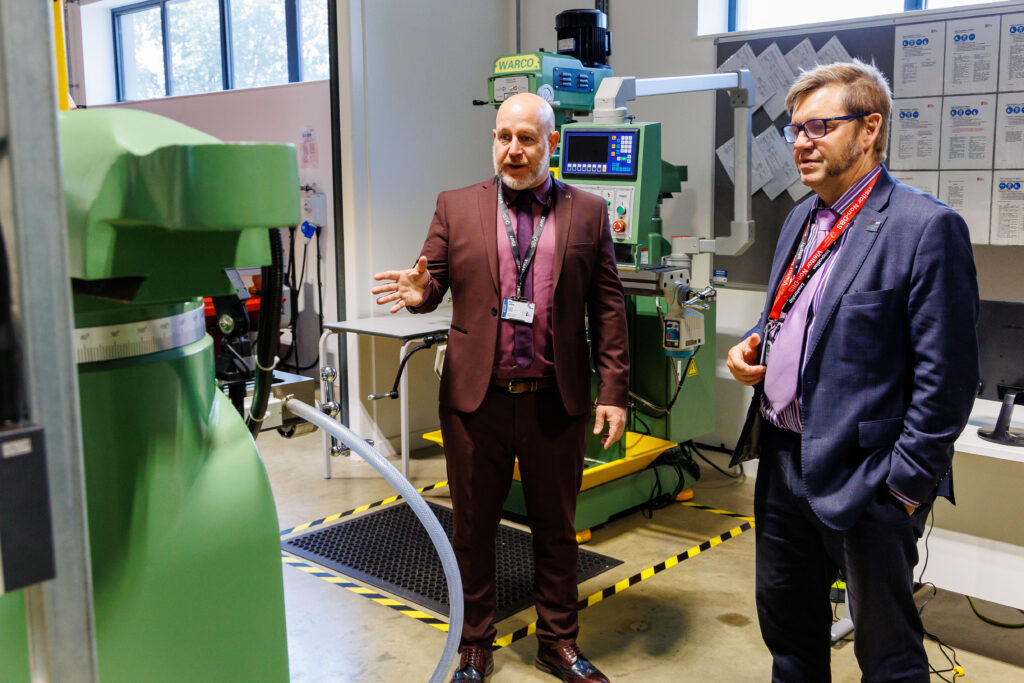In March of 2021, and a few weeks before he became Mayor of Cambridgeshire and Peterborough, Dr Nik Johnson scathingly described the £4bn Cam Metro project ambition of Mayor James Palmer as a “fools folly”. He told me at the time: “I want to start my term as mayor with a clean sheet and consider all transport options with a fresh eye.”
But winning, as it transpired, was the easy part. Succeeding in his 3 C’s goal of ‘compassion, co-operation and community’ began to look more a populist catchphrase than anything approaching the political realities he suddenly faced.
Palmer’s shock departure created alarm not simply among the well-paid consultants trousering huge sums for their work on the Cam Metro, but cast the Cambridgeshire and Peterborough Combined Authority (CAPCA) into panic mode as they came to terms, on the back of Covid, with a Labour Mayor espousing Labour policies and looking to turn those political aspirations into policies.
Housing, and the £100,000 homes scheme, was quickly confined to the WPB, and spending commitments – notably the loans to commercial developers to squeeze token affordable housing from their schemes – challenged.
And there was also, of course, the £10.5m vocational training centre at Alconbury Weald – paid for by Government money – that opened in 2018 and collapsed within two years.
CAPCA were not responsible for it but had been left to pick up the pieces – and scratch their heads at the losses.
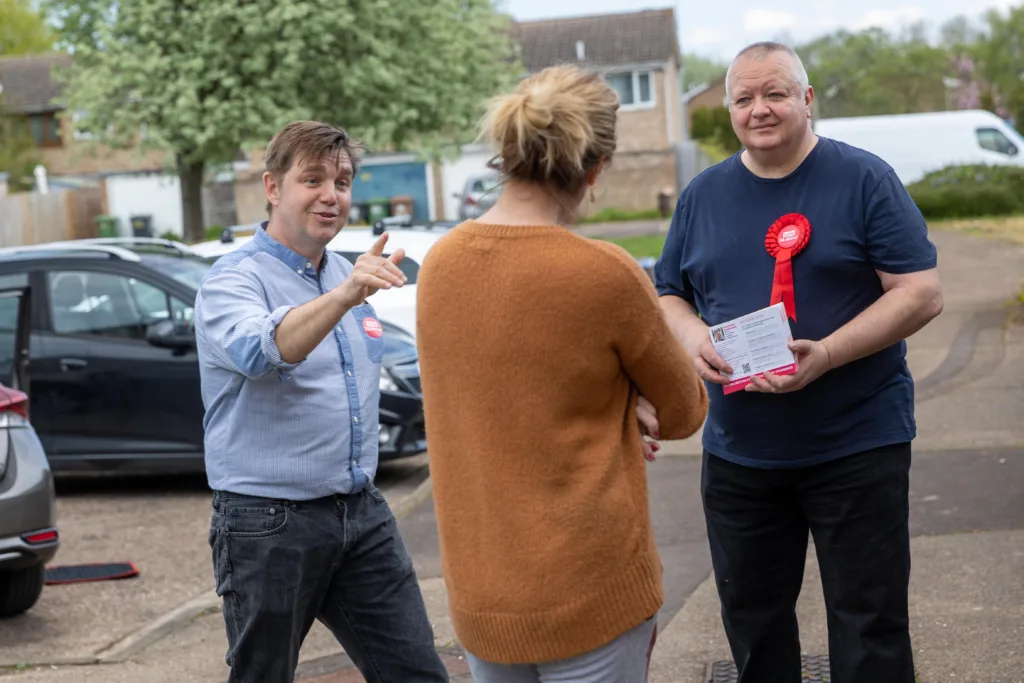
Langley, Bretton, Peterborough Picture by Terry Harris.
From an office in Ely (the location had suited his predecessor) Mayor Johnson was desperate to find his feet, quickly, and to fulfil election promises to “make meaningful change to improve public services in an area where there are real challenges of intra- regional inequality, with significant rural poverty and social isolation”.
But as the past weeks have revealed, he was ill-equipped, ill-prepared to the Herculean challenges before him – not least because CAPCA had no protocols in place for a change in political leadership, probably because no one ever expected it.
Which may explain, but not forgive, some of the turmoil that began to erupt, and which has culminated in an unedifying code of conduct hearing some two- and a-bit years later.
Mayor Nik Johnson discovers a week is a long time in politics – and its only Thursday
Mayor Nik has, rightly, taken the findings of a conduct hearing on the chin but, not surprisingly, some of the wilder claims of political foes have been dismissed.
Not to diminish the seriousness of the code of conduct hearing, but as I will explain, those critics who have been most vocal now have the choice, put up or shut up.
No doubt that will be a consideration for Cllr Anna Bailey on November 29 when she will be presented with her first opportunity to speak publicly about the findings of the code of conduct hearing into Mayor Dr Nik Johnson.
CAPCA board – on which she sits as the representative for East Cambridgeshire District Council – will hear, officially, the outcome of the breach from Edwina Adefehinti, chief officer legal and governance and monitoring officer.
Ms Adefehinti, in a strict adherence to the hearing panel subcommittee of the audit and governance committee, reports that Mayor Johnson “had breached the CAPCA’s code of conduct. One of the sanctions is that the findings of the panel should be reported to the CAPCA board”.
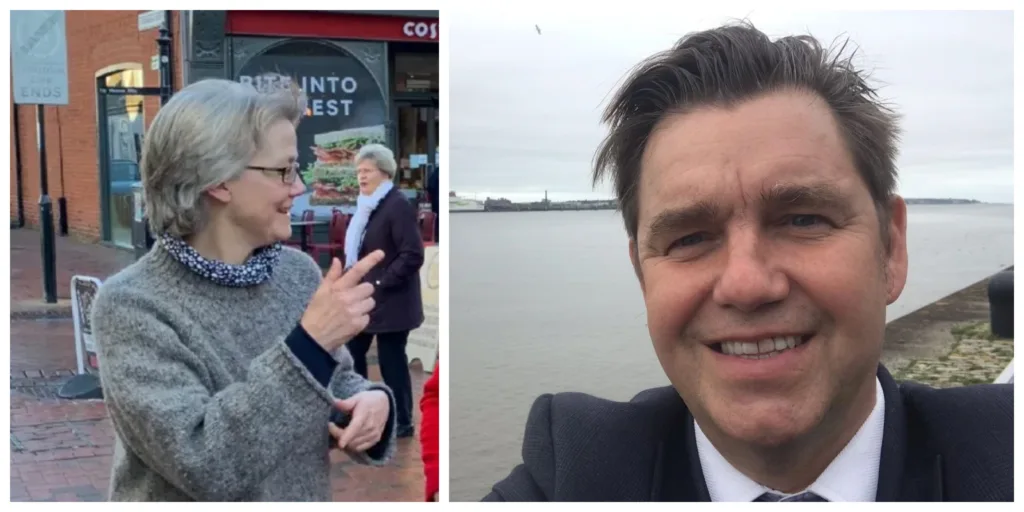
But the sanctions already imposed can neither be added to or amended, for as Ms Adefehinti says under the heading ‘alternative options’ that the “report is brought for formal noting only, therefore there are no alternative options”.
Technically, therefore, the matter will end there but Cllr Bailey faces a quandary of how to add further substance to allegations she has made public but are not referred to in the subcommittee’s findings or indeed even, so far as we can tell, formed any part of their deliberations.
The hearing concluded with directing Mayor Johnson to issue a public apology and agreeing to undertake HR training. The first has been done, the second is under way.
But Cllr Bailey wants her pound of flesh and after the subcommittee concluded its work she claimed Mayor Nik Johnson “has failed the people involved, he has breached the code of conduct, and I would have thought, the Hippocratic Oath.”
Anna Bailey’s extraordinary, damaging, deeply personal and wounding attack on Mayor Dr Nik Johnson
And she said: “The sanctions available to the hearings panel and imposed by them fall woefully short of recognising the seriousness of the events that have taken place over the last two years.”
It prompted an immediate response from the Cambridgeshire and Peterborough Combined Authority.
Their spokesperson said: “Commenting, or making speculative claims, and or statements, at this stage is inappropriate and risks identifying individuals involved throughout the independent process.”
But Cllr Bailey did not hold back and – as I previously reported – plucked information from somewhere other than documents available in the public domain that the costs also included “money for psychiatric counselling, mediation between the Mayor and the chief executive, legal fees, investigation fees, auditing fees, and additional costs for expensive interim staff”.
She said CAPCA “will come to regret” not publishing the independent investigator’s report that formed the basis of the conduct probe.
“Four members of staff have received significant pay outs on leaving the organisation in order to avoid employment claims against the authority,” she alleged.
“Some staff, including senior staff, were issued with personal protection and security equipment”.
And in an extraordinary further allegation she said: “The authority funded psychiatric counselling for some staff. A junior member of staff was instructed not to be alone in the office with the Mayor.
“The authority reported incidents to the police”.
Cllr Bailey even claimed that the calls last year for the Mayor to suspend himself were “in order to safeguard staff during ongoing investigations”.
But it is the concluding remarks of her statement that are bound to cause the greatest controversy.
Cllr Bailey added: “My thoughts are with the victims in this case, for that is what they are, those who have suffered terribly, whose stories remain unknown.
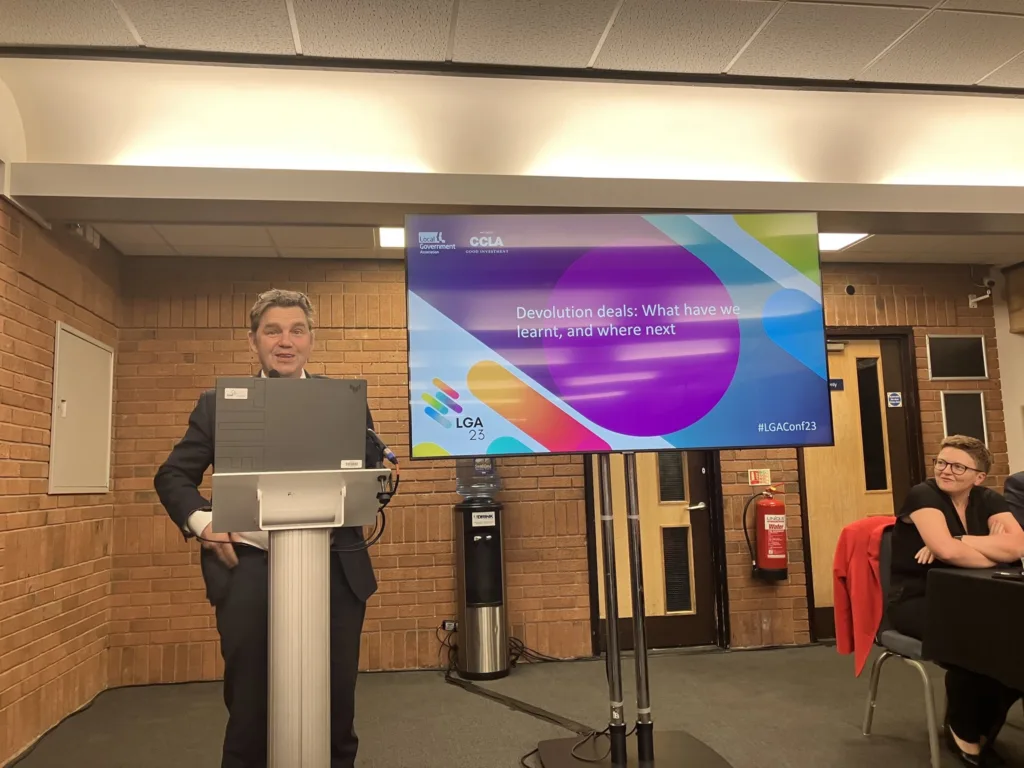
“I apologise to all those staff that have suffered at the hands of the Cambridgeshire and Peterborough Combined Authority; the authority has failed you.
“We all have a duty to call out bad behaviour, to protect others and be decent human beings.
“For elected members the code of conduct takes that further, and for a qualified practising doctor there is an overriding promise to ‘do no harm’. Mayor Nik Johnson has failed the people involved, he has breached the code of conduct, and I would have thought, the Hippocratic Oath.”
Her remarks prompted little public reaction but did include this from a fellow Tory councillor, Samantha Hoy of Wisbech, who tweeted to her 103 followers: “Stalking female staff in their homes??? Wow. Disgraceful.”
Which, of course, Mayor Johnson categorically did not do, leaving him with the possibility of bringing legal or code of conduct hearings to remedy the distortions.
This week CAPCA provided the public with a ‘decision notice’ that provides more detail and adds to their earlier summary. There will be no more for critics to feast upon.
But if you have the time, and inclination, here’s what has been released.
We learn that it all began when an anonymous complaint was received against the Mayor in October 2021 and involved the actions of both the Mayor and another individual, who has since left CAPCA.
CAPCA considered this a “whistleblowing” complaint, and an independent investigation was carried out.
Following the conclusion of that process, the monitoring officer determined on 22 April 2022, to formally investigate it.
Mayor Dr Nik Johnson apologises ‘unreservedly for those I gave reason to complain’
Two further complaints relating to the actions of the Mayor were received on 9 May 2022 and on 11 May 2022.
The investigation concluded on 27th September 2023, and the monitoring officer “then assessed the findings… and decided that the matter should be referred to the panel for a determination”.
The investigation was carried out by Mark Heath, a solicitor with over 30 years of service within the public sector.
“Certain aspects of the first complaint pertained to financial matters and certain aspects of the third complaint related to the leaking of information,” says the report.
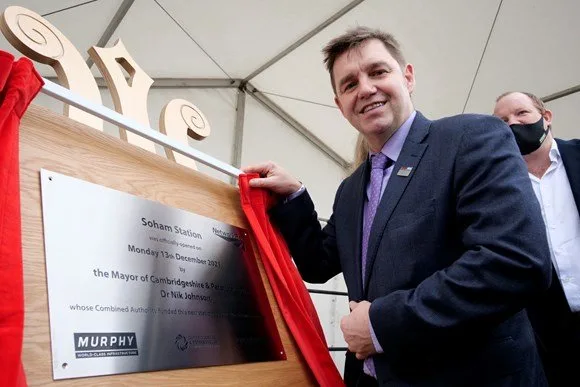
The probe was hampered by the Mayor’s health break for heart surgery but by March 2023 the independent investigator was able to reinterview him.
So, what was it all about?
1: The independent investigator considered the allegation of unacceptable conduct intended to overturn findings of a whistleblowing report for political purposes, in that the Mayor (in effect) ran a campaign to undermine officer decision making/processes, refused to accept outcome of internal processes, and called into question integrity of staff/officers.
Whilst it is clear that the Mayor was unhappy in relation to the departure of an ex-employee, the evidence did not in the view of the independent investigator show the Mayor’s behaviour amounted to a breach of the code.
He was entitled to challenge the report and outcomes. His methods may not always have been appropriate, but the independent investigator did not consider that the evidence supported the allegation.
As a result, the independent investigator did not consider that the Mayor broke the Code by bullying to try to overturn the report.
EXPOSED: The wrecking tactics of a council leader and an MP
On balance, the independent investigator concluded on the evidence before them that the Mayor did not breach the bullying and harassment standard (either through his own actions or his failure to address the actions of the others) in respect of this allegation.
2: Leaks; leaking of the whistleblowing report
This issue was the subject of an investigation by specialists. However, the specialists’ inquiry did not yield any evidence to tie the Mayor to the leak.
In relation to the leaked letter/ disclosure of confidential CAPCA information to an ex-employee, there is no evidence that the Mayor leaked the letter.
The Mayor did speak to a journalist, contrary to advice, but there is no evidence to support any contention that he personally supplied confidential information to him.
3: Sending an ex-worker’s CV from the Mayor’s work email to his home email.
The sending of the CV from the Mayor’s work email to his home email was not at the time considered a breach of GDPR by the CAPCA, as there was no proof that anyone other than Mayor saw it.
In terms of him sending it to his personal email address, the CAPCA’s monitoring officer has confirmed that the relevant IT policy / protocol was not in place / force at the material time.
However, today it would be contrary to the CAPCA’s policies, a breach of that protocol and hence the code
The independent investigator reflected upon this further in the light of the complainant’s comments on the draft report, but the points made above remained, in the investigator’s view, the deciding factors.
Namely there was no evidence that it was shared with a third party and at the material time the CPCA’s protocols did not prohibit the Mayor from sending the CV to his home email
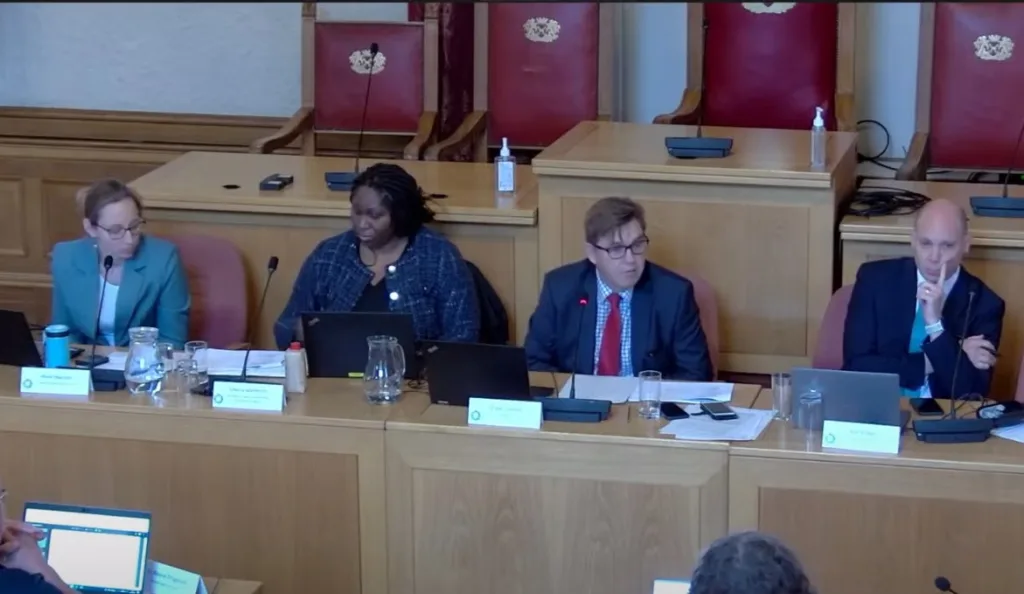
4: Expenses allegation
Whilst the way in which expenses were handled within the Mayor’s office may not have been as good as they should/might, the CAPCA’s control system was also not robust.
The lack of challenge, lack of scrutiny and the failure to pick up duplicates are cited by the specialists who investigated this matter.
The Mayor denied culpability or responsibility for any failings although he was, of course, as Mayor ultimately responsible for his expenses claims.
However, given the weaknesses in the control system, the independent investigator did not believe that the Mayor, on balance, misused CAPCA resources.
Mayor Dr Nik Johnson to undergo open heart surgery
He was entitled to rely on his staff to make claims correctly and for the system to function effectively, including the control framework which should have flagged/raised issues when they arose.
The control framework had clear weaknesses which contributed to the problem. Had it been effective it would have flagged issues early on and then errors or issues in claims could have been addressed.
On balance, the independent investigator did not consider that the evidence showed that the Mayor misused CAPCA resources, but it did show that the Mayoral office had not always processed claims correctly and the control regime system had weaknesses. The independent investigator therefore concluded that the Mayor did not breach the code of conduct in this respect.
5: Bullying
The first complaint alleged that there was a toxic culture and bullying behaviour within CAPCA. Specifically, that the Mayor was intent on making sure that a senior officer left and didn’t stay in post, and that other officers should ignore the senior officer.
The independent investigator considered the allegation against the code and the Nolan principle of leadership, noting that the behaviour of others within the Mayor’s office was also relevant.
However, following the analysis of the facts, the independent investigator did not find that the Mayor had breached the code in regard to bullying.
6: Civility
The independent investigator considered that, if substantiated, the allegations in the first complaint and the third complaint would amount to a failure to “treat authority employees […] with civility and respecting the role that they play” and were therefore relevant to the allegations that the Mayor has breached the “civility” standard.
The independent investigator also noted there had been no allegations that they were aware of that the Mayor had failed to treat any members (i.e. fellow members) or members of the public with civility and respect. The allegations were therefore confined to his interactions with officers (i.e. the second limb of the “civility” standard) only.
OPINION: Bungled devolution and shattered public transport ambitions
It was relevant to understand and consider the outcome of the whistleblowing investigation (which included allegations of lack of civility and respect on the part of an ex-employee) and the relationship between the Mayor and that ex-employee. That was in order to assess to what extent the Mayor could be said to be responsible for the ex-employee’s conduct, particularly taking account of the Nolan principles – specifically “leadership” – as appropriate.
The independent investigator’s assessment was that neither an alleged statement to staff nor the Mayor’s personal treatment of a previous senior officer were sufficiently serious to warrant a finding that he breached the “civility” standard.
This did not mean that the Mayor’s actions in either regard were acceptable.
The independent investigator also considered, in relation to civility, the allegation that the Mayor was intent on making sure that an ex senior officer did not stay long; and that people should ignore that ex-senior officer and go to the Mayor and another ex-employee instead.
The independent investigator noted what the ex-employee had to say in relation to the position of the senior officer generally, and also that the Mayor wished to encourage people to approach him.
The independent investigator also considered that the lack of understanding of roles of responsibilities was no doubt a contributory factor to the perception that the Mayor’s office was eroding the role of a senior officer.
Overall, the independent investigator found no evidence to support a view that the Mayor actively attempted to achieve either outcome.
The independent investigator considered that much of what was complained about in relation to the allegation of a bullying and toxic culture, which was also relevant to considering civility, emanated from an ex-employee.
Whilst the independent investigator was not investigating this ex-employee, their actions and the Mayor’s awareness and response to the ex-employee’s conduct was relevant, when taking into account the principle of “leadership”.
The independent investigator also took account of the relevant Nolan principle, which the code requires them to take into account in interpreting the code relating to leadership, namely: The independent investigator was also aware and took into account that the code states: “Holders of public office should exhibit these principles in their own behaviour. They should actively promote and robustly support the principles and be willing to challenge poor behaviour wherever it occurs.”
“Accordingly, when acting in your capacity as a member or co-opted member … (i) You must promote and support high standards of conduct when serving in your public post or business board post, in particular as characterised by the above requirements, by leadership and example.”
The Mayor’s evidence is that, with the exception of an incident between a senior officer and an ex-employee in which he surmised they were equally at fault, he did not personally witness any inappropriate behaviour on an ex-employee’s part.
On review of the evidence the independent Investigator found this implausible.
The Mayor must have been aware of various and serious issues regarding the ex-employee’s conduct. The issue was specifically drawn to his attention in September 2021.
Those involved at the time or who witnessed, were party to or later became aware of such interactions were quite entitled – in the absence of the Mayor’s obvious intervention – to conclude that the Mayor was aware of and potentially even supportive of or directing the ex-employee’s behaviour or was behaving in such a way himself.
The independent investigator received different accounts and views as to the extent of the Mayor’s knowledge of the ex-employee’s behaviour, i.e., whether the Mayor actively encouraged their conduct for his own purposes (i.e. was the controlling mind), or whether the ex-employee acted of his own instigation and the Mayor failed to address it.
The independent investigator commented that the Mayor may have spoken to the ex-employee about their behaviour, as he told the investigator he did, but there was no evidence of this; either direct evidence (e.g. a text message/email) or evidence in terms of a notable change in the ex-employee’s conduct.
In terms of failure of “leadership” (to respond to poor behaviour on the part of those within an office to which the Mayor had close oversight), the Independent investigator again took account of Article 10 where appropriate in terms of the Mayor’s enhanced rights regarding freedom of expression.
The independent investigator therefore found that the Mayor had breached the code with regard to civility.
7: Disrepute
The independent investigator noted that in the messages he had seen between two ex-employees, one of the ex-employees was extremely critical of CAPCA and the key players, including making extremely derogatory and potentially even threatening and defamatory remarks about them.
The Mayor was not party to these messages.
However, a small number of WhatsApp messages in which the Mayor did participate did include reference to a human resources activity and outcome. In the most part, this was the ex-employee sharing updates and their views regarding the process.
The Mayor was aware such discussions were inappropriate. He should have intervened to end such discussions but did not.
He did not instigate or post the information but was fully aware from the briefings he had had that this was confidential and not to be bandied about.
He should certainly have shut down the ex-employee when they made reference to the matter to the Mayor and another ex-employee, but the Mayor failed to do so.
In the independent investigator’s view, the failure of the Mayor to intervene/call out the bad behaviour showed a lack of respect and leadership that was essential to his office and as a result damaged the reputation of the role of Mayor.
The rationale for directly elected Mayors was to provide for clear and singular leadership, making it visible to all where the responsibility for decisions lay.
The directly elected Mayoral model had been described as the strongest model of political leadership.
This was because the model provided for one person, the directly elected Mayor, having complete and sole political responsibility; a single leader rather than as exists elsewhere in local government, a cabinet or committee system where accountabilities are blurred.
On balance, the independent investigator concluded that the Mayor was aware of the ex-employee’s unacceptable behaviour towards others and did not call out that behaviour; nor did the Mayor take sufficient and appropriate steps to stop it.
In view of the seriousness of the conduct and the fact that this was, at the time, an employee of the CAPCA, it would have been appropriate for the Mayor to engage with HR in the event that the ex-employee failed to take heed of any instructions from the Mayor or others requiring them to regulate their behaviour.
Given the ex-employee’s position, the independent investigator would have expected the Mayor to recognise the importance of doing so.
His failure to intervene amounted to him condoning such behaviour.
It was particularly surprising that the Mayor did not take suitable steps (including seeking support from HR) on receipt of the stark warning regarding the ex-employees conduct (in which the ex-employee was referred to as a “henchman”) in an email to the Mayor in September 2021.
As that single strong point of leadership, as the political leader of the CAPCA, the Mayor should have set an example.
Instead of that, his failure to act effectively was a significant failure of leadership, something that a directly elected Mayor is specifically elected to deliver.
In contrast, the independent investigator did not consider that the failings of the Mayor damaged the reputation of the CAPCA, and hence did not conclude that the Mayor, by his actions, also brought the CAPCA into disrepute.
Such a finding would only follow the most serious breach/es and the most culpable conduct with commensurate impact upon the body itself.
The independent investigator’s findings were serious, but the Mayor did not directly act in a disrespectful manner to employees or others.
Nor did he directly bully.
The disrepute he inflicted was upon himself in his role as Mayor, the political leader of the CAPCA, due to his lack of leadership.
The independent investigator believed that was a fair, proportionate and evidenced finding.
To take the next step to make a finding that he also brought disrepute on CPCA would require something more culpable and significant, which was not present in this matter.
8: Other Points
The independent investigator was made aware during their investigation that members’ behaviour at board meetings generally was sometimes an issue. This was something that he recommended that the monitoring officer reflect upon and intervene, should she feel it appropriate.
At the point of the investigation there were clearly governance issues, these may have been addressed but, if not, they should be.
The Mayor must adopt and practise sound governance practices. He needs to understand and, unless he has good lawful reason not to abide by requirements around, for example, confidentiality.
The independent investigator understood that induction processes for new Mayors (and others, as appropriate) had been revised but this was a significant issue, and the revised approach must not leave the CAPCA in a similar position again.
The appointment of an ex-employee raised several issues in terms of the politically restricted / non-restricted post decision and the decision to appoint them which was not made on merit.
This was a major contributory factor for all that followed, and the adverse impact was felt by all, including ultimately the ex-employee (and those negatively impacted by their conduct).
STATEMENT FROM DR NIK JOHNSON
In a statement, Mayor Johnson said: “I’ve had a lot of time to reflect on what happened in those early days and have long since realised that much of it needn’t have.
“I regret having been a cause of upset and apologise unreservedly to those for whom I gave reason to complain.
“I am sorry, and I’ve wanted to say so for ages. I wish I knew then what I know now.
“I’m a better person for everything that’s gone on, and – I’d argue – a better mayor.
“I wish the organisation we were part of then was the one it is now, as it is so much better in every conceivable way.
“I say that because I genuinely believe all of these improvements began back then, and I can only hope that the very real, very public progress made since provides something in the way of solace.”



